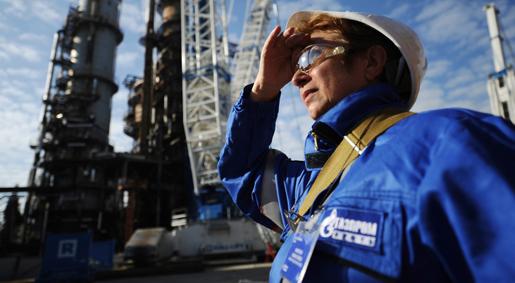
GAZPROM WANTS €

FT. The oil arm of Russia's state-owned Gazprom is preparing customers to settle contracts in euros rather than dollars as it braces for the possible escalation of US sanctions against Moscow.
Alexander Dyukov, chief executive of Gazprom Neft, told reporters in St Petersburg that the company had discussed shifting contracts to euros with its customers. "Practically all – 95 per cent of our customers – confirmed their willingness to move to settlement in euros," he said.
The discussions reflect the growing fear among larger Russian companies that they could soon come into the cross-hairs of US and European sanctions that have so far targeted wealthy individuals and a single mid-sized bank – Bank Rossiya.
One senior banker said that many commodity groups, including Gazprom Neft, had held talks with bankers about financing in euros rather than dollars. "Every commodity sector business is talking about what is possible if you couldn't do deals in dollars – if you couldn't get dollar clearing through New York," he said.
Such a switch could result in higher costs for companies because of the need to convert currencies and the lower liquidity for those other than the US dollar.
Russian stocks tumbled on Monday after pro-Russian separatists in Donetsk said they would hold a referendum for the eastern province to join Russia, mimicking earlier moves that lead to Crimea's annexation. The benchmark Micex index fell 2.4 per cent, with Sberbank down 3.7 per cent and Gazprom 2.5 per cent weaker.
The US sanctions – imposed in response to the Crimean annexation – effectively prohibit named companies and individuals from dealing in dollars, lawyers and bankers say.
Andrei Kostin, chief executive of state bank VTB, said over the weekend that Russian exporters should consider payments in roubles rather than dollars. "To a certain degree this would be a guarantee that, if at some point someone decided to impose Iran-style sanctions on us, we would have a level of protection from it," he told state television.
Mr Kostin, one of the most senior figures in the Russian business community, added that he had spoken to the heads of three of the largest Russian exporters – Gazprom, Rosneft, and Rostec – and that they were "in principle ready to do this".
"It is somewhat strange that a payment from Kazakhstan to Russia goes through New York," he said. Gazprom said that it was considering the idea, but Rosneft said that it would "settle payments in the currency of the contract".
Norilsk Nickel, the world's largest nickel and palladium miner, earlier told the FT that it was discussing denominating long-term contracts with Chinese consumers in renminbi.
Western sanctions have so far had minimal impact on the Russian commodity sector's ability to export. But there are worries among some executives that further rounds of sanctions from the US could target the energy sector, which accounts for about half of Moscow's budget revenues.
Robert McNally, president of Rapidan Group and a former White House oil adviser, said that he expected the next round of sanctions – if it came – to hit investment in oil and gas production.
"In the event Washington and the west are unable to prevent Putin invading southeastern Ukraine, there will be broad-ranging sanctions from the US side that will touch US energy companies," he told the FT.
"In terms of western investment in promising frontier areas in Russia, it would be very negative for those companies and negative for Russia. They would lose capital and technological expertise and momentum that has been built up already. It would be quite disruptive."
Mr Dyukov of Gazprom Neft acknowledged that a shift away from dollars would not be without costs to the company.
"I am not ready to say that such a shift will happen absolutely painlessly and without losses," he said.
Alexander Kornilov, oil and gas analyst at Alfa Bank in Moscow, said that the shift, if it happened, could hurt Russian companies' earnings.
"Switching to the rouble would imply some extra undesirable transaction costs for international buyers, and this could threaten to undermine the competitiveness of Russian oil and gas producers on the global market," he said.





